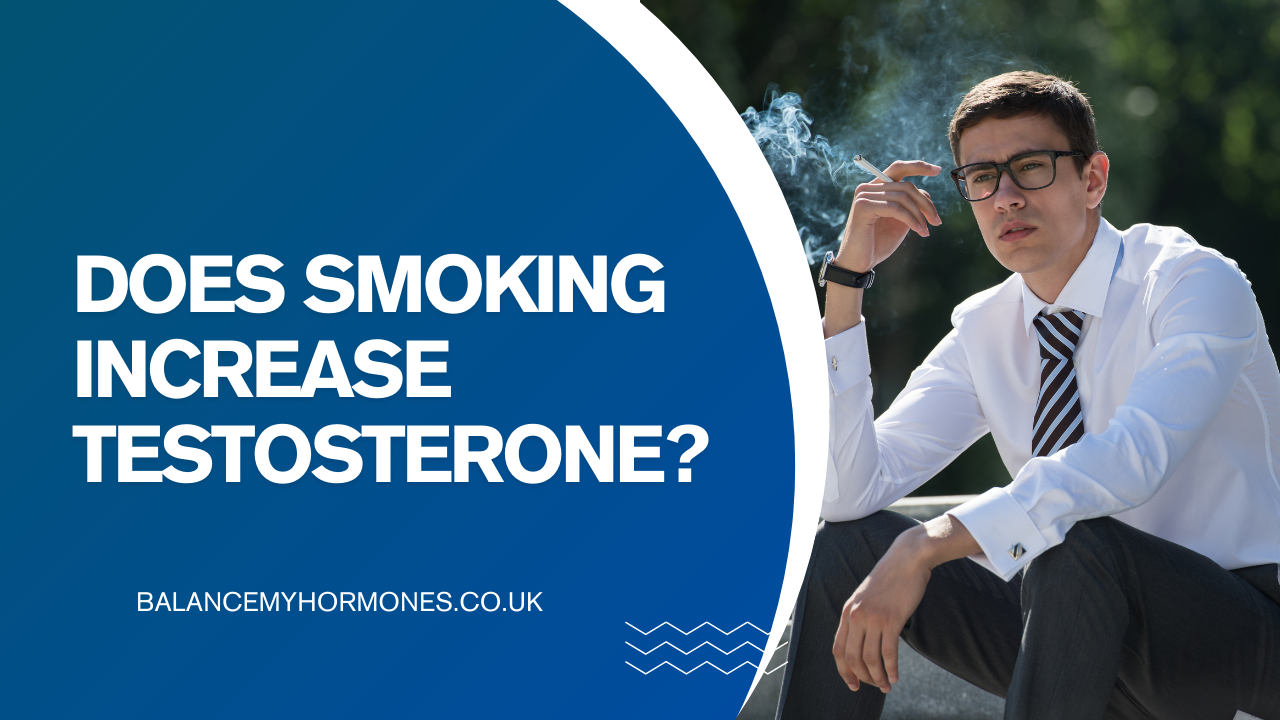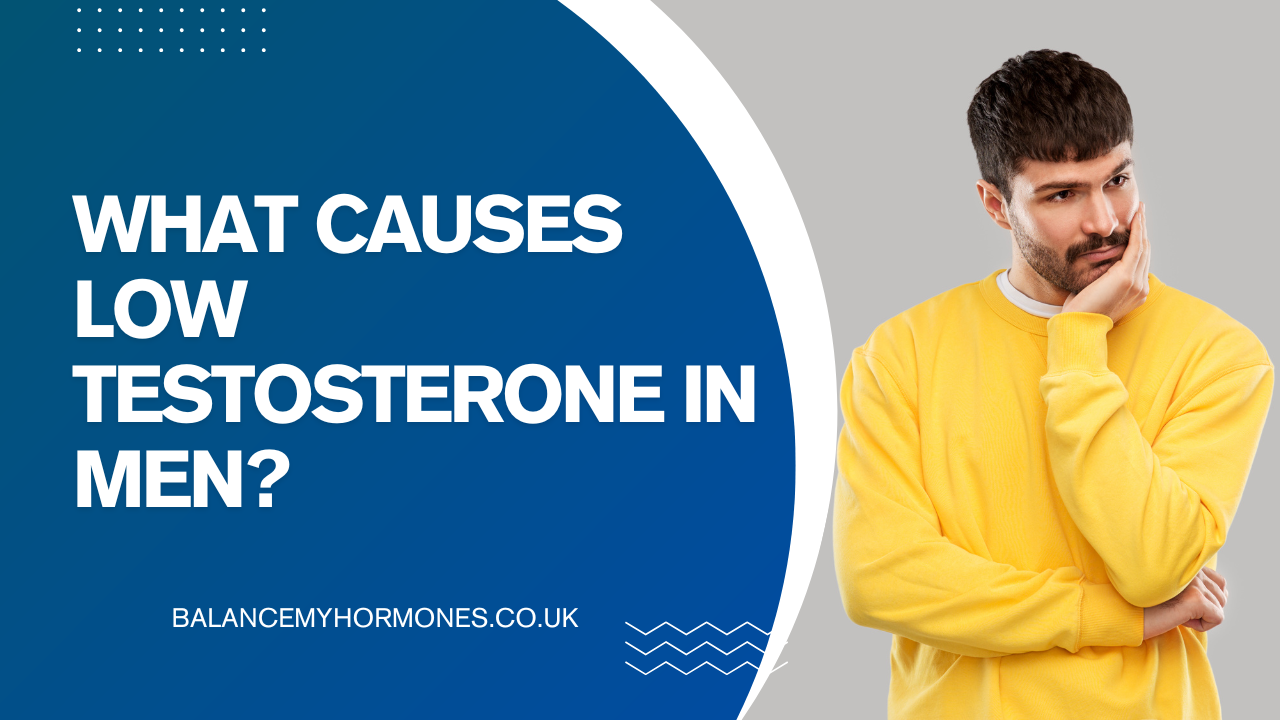
By Mike Kocsis | 7 minutes read | Last updated: September 2, 2025 Categories: Testosterone
Medically Reviewed by Dr. George Touliatos
Does smoking increase testosterone? The answer is: yes and no.
According to some studies, smokers have higher total and free testosterone levels than non-smokers. However, this effect is only temporary as smoking can lead to low T in the long run by negatively impacting overall health.
Current data shows a complex connection between smoking and testosterone that appears to vary based on factors like age, duration of smoking, overall health, etc. Let’s understand this connection in detail, debunk common myths and find out the truth.
Smoking and testosterone: What’s the connection?
Various studies show that smoking may increase testosterone in men.
For instance, a meta-analysis of 28 observational studies involving 13,317 men found that smokers had higher mean total testosterone levels (1.53 nmol/L) compared to non-smokers.
Experts believe that it might be because some chemicals present in the cigarette smoke inhibit testosterone breakdown, increasing its levels in the blood for a short time.
A 2024 study also found a positive association between serum cotinine levels (a biomarker for nicotine exposure) and total endogenous testosterone levels. However, researchers observed that higher cotinine levels led to higher testosterone up to a certain threshold, beyond which the relationship reversed.
Unlike these studies that demonstrate a positive correlation between smoking and testosterone, some studies show that smoking decreases testosterone.
A 2021 study involving 289 participants concluded that smokers had a lower testosterone level than non-smokers. The researchers noticed that as the duration of smoking increased, serum testosterone declined more significantly.
This study also observed that smokers had a higher estradiol level than non-smokers, which further disturbed hormonal balance.
Likewise, a more recent (2025) study noted that smoking was associated with lower total testosterone levels in men.
The researchers suggested that this could be due to the toxic effects of cigarette smoke on Leydig cells, which are responsible for testosterone production.
So far, the available data shows varying results: some suggest smoking may increase testosterone in some cases, while others show that smoking may lead to lower T over time.
Any short-term testosterone increase (if there is any) comes with significant risks to reproductive and overall health.
And smoking’s potential hormonal effects don’t outweigh its negative health effects like lung cancer, respiratory diseases, heart disease and asthma.
So, it is best to avoid smoking altogether and look for proven ways to increase reproductive hormones like TRT.
Hormone imbalance in smokers
Cigarette smoke has over 4000 dangerous chemicals that can disturb your body’s normal functioning in various ways.
Many of these chemicals disrupt the endocrine system, leading to hormonal imbalance in both men and women. Major hormones that get disturbed by smoking are:
- Thyroid hormones
- Testosterone
- Estrogen
- Follicle-stimulating hormone
- Luteinizing hormone
- Cortisol
- Prolactin
These hormonal imbalances contribute to various health problems like early menopause, menstrual cycle irregularities, diabetes, sleep issues and acne.
No doubt, smoking is one of the leading causes of preventable deaths worldwide.
Does smoking affect sperm count and fertility?
Smoking doesn’t just impact hormone balance, but it can also cause grave problems like male infertility and low sperm count.
There are many studies that prove this point. For instance, a 2024 research conducted on 1938 infertile men, including both smokers and non-smokers, found that smokers had:
- Low semen concentration
- Decreased sperm counts
- Low sperm motility
- Low sperm viability
They also noted that heavy smokers had more disturbed semen parameters than moderate smokers.
It is best to quit smoking to improve not only male fertility but also your overall health.
Quitting smoking & testosterone levels: Will quitting smoking increase testosterone?
Since the impact of smoking on testosterone is still not fully clear, it is difficult to determine whether smoking increases testosterone.
Studies also show conflicting results in this area. Some show quitting smoking causes testosterone fluctuations in the beginning and then the hormone levels stabilise (not more or less than what they used to be before smoking cessation), while others conclude that quitting smoking may initially increase testosterone.
A study concluded that quitting smoking had no significant impact on testosterone but it reduced sex-hormone binding globulin (SHBG) in former smokers.
SHBG is the protein that attaches to testosterone in the blood and makes it unavailable to the body. Your body tissues can only use free testosterone (testosterone that’s not bound to SHBG). Low SHBG can result in high free testosterone.
Nonetheless, quitting is still strongly beneficial as it can improve your erectile function, cardiac health, blood circulation, and overall health in so many ways.
Medical interventions for low T
Men dealing with low testosterone should look for reliable treatments like TRT rather than turning to smoking, which only worsens overall health.
Testosterone replacement therapy is an evidence-based treatment used to restore low T in men with medically diagnosed testosterone deficiency. It’s not prescribed for natural age-related decline.
TRT can help men improve their low T symptoms, including erectile dysfunction, low energy, and low sex drive.
However, it is important to consider TRT’s side effects as well before you start taking testosterone.
Talk to one of our TRT specialists today to determine whether you are the right TRT candidate.
FAQs about smoking and testosterone
Do cigarettes increase testosterone?
Some studies have found that cigarettes may increase testosterone in men, possibly due to changes in hormone metabolism. But this effect can reverse in the long run.
Does smoking weed affect your sperm?
Yes, smoking weed can reduce your sperm count, concentration, motility and viability according to various studies.
How long after quitting vaping does fertility improve?
Experts believe that it can take toxins up to three months to fully clear from the body and for sperm quality to improve. However, full recovery can vary based on your lifestyle and reproductive health.
Does tobacco smoking increase testosterone?
The effect of tobacco smoking on testosterone levels is unclear yet because the currently available data show mixed results. It is best to avoid tobacco because of its negative health effects.
Does nicotine increase testosterone?
Studies show conflicting results regarding nicotine’s impact on testosterone. Some studies report slightly higher T levels in smokers but these results are inconsistent, likely influenced by other factors. Overall, nicotine is not a safe way to increase testosterone.
Summary
The impact of smoking on testosterone is unclear yet. Some studies show that it can increase testosterone, while others describe the opposite effect.
Still, we all know how harmful smoking is to a person’s overall health. So, it is best to avoid it no matter what.
If you are actually testosterone-deficient, you should go for treatments like TRT that actually work. TRT can help low-T men improve muscle mass, libido, bone mineral density, and more.
References
Al‐Odat, I. and Al‐Fawaeir, S., 2025. Impact of Tobacco Cigarette Smoking on Semen Quality and Serum Levels of Sex Hormones in Men: A Cross‐Sectional Population‐Based Study. Health Science Reports, 8(6), p.e70893.
Liu, M., Gou, Y., Zou, B., Li, X. and Yang, P., 2024. Association between serum cotinine and total testosterone in adult males based on NHANES 2011–2016. Scientific Reports, 14(1), p.23042.
El Salam, M.A., Zaki, S., Mousa, M.S. and Motawi, A., 2021. Effect of cigarette smoking on serum testosterone level among male smokers: a cross-sectional study. The Egyptian Journal of Chest Diseases and Tuberculosis, 70(1), pp.124-127.
Evidence Based Research
This article has been researched and written based on scientific evidence and fact sheets that have then been crossed checked by our team of doctors and subject matter experts.
References, sources and studies used alongside our own in-house research have been cited below, most of which contain external clickable links to reviewed scientific paper that contain date stamped evidence.
Our team of healthcare experts and GMC registered doctors are licensed to UK GMC standards. We strive to provide you with the latest evidence based, researched articles that are unbiased, honest and provide you with accurate insights, statistics and helpful information on the discussed topic to ensure you gain a better understanding of the subject. You can read more about our Editorial Process by clicking here.
We value your feedback on our articles, if you have a well-researched paper you would like to share with us please contact us.
Quick Low Testosterone Test
If you know your total testosterone reading from a previous blood test input the results to the left above to see if your testosterone levels are normal.
Low Testosterone Levels
You may have low testosterone depending on the symptoms you have, please contact us to find out how we can help.
Please Retry
The Total Testosterone Level You Entered Is Incorrect. Figure Must be in nmol/L you can use our converter here.
Normal Testosterone Levels
Your testosterone levels appear to be in the normal range.
LOOKING GOOD!
You must be over 38, have had your ovaries removed or have suffered with premature menopause to warrant further hormone tests.
Further investigation needed
Please contact us to discuss your hormones, we need your total testosterone levels to validate your hormone deficiency. You can order a blood test here.
Low Testosterone Levels
You may have low testosterone depending on the symptoms you have, please contact us to find out how we can help.
High Testosterone Levels
You appear to have higher than normal testosterone levels, please contact us for further investigation.
Normal Testosterone Levels
You appear to have normal testosterone levels. Contact us if you have any concerns.
 Mike Kocsis has an MBA with a focus on healthcare administration and is an entrepreneur and medical case manager for Balance My Hormones which offers medical services in the UK and Europe. Mike has over 25 years of experience in the healthcare sector, much of that working with people who have hormone imbalances. Mike has appeared on
Mike Kocsis has an MBA with a focus on healthcare administration and is an entrepreneur and medical case manager for Balance My Hormones which offers medical services in the UK and Europe. Mike has over 25 years of experience in the healthcare sector, much of that working with people who have hormone imbalances. Mike has appeared on 

